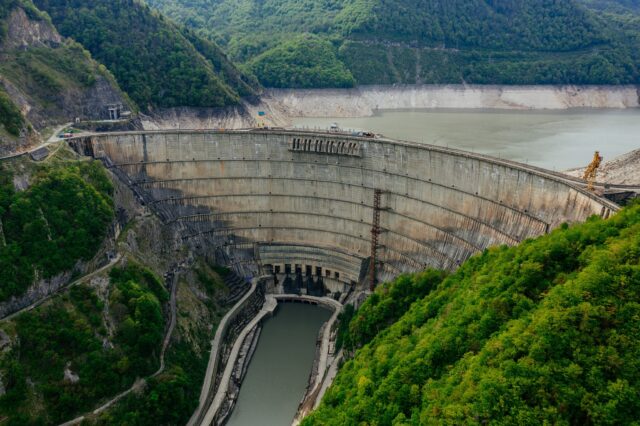
Occupied Abkhazia Faces Electricity Crisis
Publication: Eurasia Daily Monitor Volume: 22 Issue: 6
By:

Executive Summary:
- Abkhazia is experiencing an energy shortage due to low water levels in the Enguri hydroelectric dam. Illegal cryptocurrency mining further exacerbates the shortage, which has increased Abkhazia’s reliance on Russian electricity.
- In September, Abkhazia blocked a law allowing Russian citizens to buy real estate in the region. This decision angered Moscow, which subsequently pulled its energy assistance to the region, exacerbating the energy crisis.
- Moscow appears less focused on broader geopolitical implications involving Georgia or Western actors regarding Abkhazia, instead prioritizing the region’s compliance with laws and agreements that bolster its control.
In recent months, Abkhazia, a breakaway Georgian region that has been occupied by Russia since it invaded Georgia in 2008, has faced a combination of political turmoil and an energy crisis. In the last months of 2024, Abkhazia grappled with severe electricity shortages primarily due to the low water levels in the Enguri hydroelectric dam, which straddles the border between the separatist Abkhazia and the rest of Georgia. The electricity needed in Abkhazia beyond what the Enguri dam produced was traditionally supplemented with imports from Russia, Abkhazia’s patron (The Moscow Times, December 11, 2024).
Funding from Russia for electricity in Abkhazia was secured only through mid-December 2024, leaving uncertainty about energy arrangements starting January 2025. Moreover, Abkhazia used to receive electricity from Russia at a discounted rate or for free as humanitarian aid. This assistance, however, was cut after Abkhazia failed to pass a law allowing Russians to purchase residential property in the region (see EDM, July 31, 2024). Since September 2024, Moscow has been selling electricity to Abkhazia at standard market rates, which Abkhazia could barely afford (The Kyiv Independent, December 11, 2024). The region could only pay for nighttime electricity imports from Russia, costing 8–10 million Russian rubles ($77,600 –97,000) per night because the cost of daytime electricity imports—around 30 million rubles ($291,000) per day—was too expensive (Interfax, December 13, 2024).
The electricity crisis is compounded by illegal cryptocurrency mining in Abkhazia. Crypto mining uses about 1 million kilowatt hours (kWh) of electricity daily, while the annual electricity deficit in Abkhazia stands at 700–750 million kWh (see EDM August 14, 2020, June 5, 2024; Interfax, December 4, 2024). The Enguri hydroelectric plant generates 1.8 billion kWh annually, yet nearly 1.6 billion kWh is lost to illegal mining operations, leaving little for general use (Jam News, March 3, 2023; RBC, December 17, 2024). So far, efforts to curb illegal mining have included proposals to shut down the internet at night, but these measures faced resistance from internet providers due to potential financial losses. A lack of internet would also disrupt essential services such as gas stations, ATMs, shops, and hotels. While some moves to confiscate mining machines have been made, similar efforts saw little results as the machines would be replaced (Jam News, December 13, 2024). In the past, Abkhazia has relied on Russia to supplement the energy used by cryptocurrency mining.
There remains some potential for improved relations between Russia and Abkhazia despite the energy crisis. Moscow continues to discuss investment agreements and social support with the de facto Abkhazian government. Abkhazia’s new de facto leadership, however, appears reluctant to align fully with Moscow’s demands. Nevertheless, Sukhumi’s recent appeals to Moscow for assistance suggest an ongoing dependency on its patron. In the long term, the government in Abkhazia risks losing the support it has enjoyed so far. The deepening crisis may push Abkhazia to concede to Russia’s demands on a shelved investment agreement to resolve its pressing energy and social issues.
The government’s cries to Moscow for help produced some immediate results on December 23, when Russia began sending electricity as humanitarian aid to the region (TASS, December 23, 2024). This has not been enough, however, to combat the current situation. Since early January, blackouts have resumed, though only for a few hours at a time (Gazeta.ru, January 2). Reports from January 9, however, indicated that new restrictions are being introduced in Abkhazia. According to new rules, the power will be turned off for six hours a day (Kommersant, January 8).
Russia continues to strategically exploit its influence over Abkhazia. Moscow appears less focused on broader geopolitical implications involving Georgia or Western actors, instead prioritizing the region’s compliance with laws and agreements that bolster its control. Should the new Abkhaz leadership delay addressing investment agreements, Russia has various means at its disposal to exert further pressure on the region. In one of the latest examples, at a briefing on December 25, Russian Foreign Ministry Spokesperson Maria Zakharova said that Sukhumi must fulfill its own part of responsibilities in exchange for Moscow’s gesture of goodwill (Civil.ge, December 26, 2024).
The crisis in bilateral relations has not changed Abkhazia’s ties with Russia. The consensus is to strive to build closer relations with Moscow, as the alternative appears to be only Tbilisi or Türkiye. The latter hosts a large Abkhaz diaspora, and extravagant political ideas of relying on Türkiye instead of Russia have always been present in Abkhazia. It seems unrealistic, however, as Abkhazian politicians understand that they will have to work with the Russian side. For instance, the acting president of the separatist region, Badra Gunba, stated that the region will strengthen relations with Russia, which he called a friend and ally. In his New Year’s address, Gunba said, “Abkhazia has friends, it has allies, close historically, culturally, and spiritually. This connection unites the Republic of Abkhazia with the Russian Federation, and we will strengthen these relations” (Interfax, January 1). As Georgia straddles the line between a Western or Russian future, it appears Abkhazia will stay under Russia’s influence for the time being.



